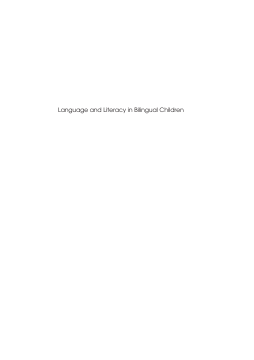
Additional Information
Book Details
Abstract
This book sets a high standard for rigor and scientific approach to the study of bilingualism and provides new insights regarding the critical issues of theory and practice, including the interdependence of linguistic knowledge in bilinguals, the role of socioeconomic status, the effect of different language usage patterns in the home, and the role of schooling by single-language immersion as opposed to systematic training in both home and target languages. The rich landscape of outcomes reported in the volume will provide a frame for interpretation and understanding of effects of bilingualism for years to come.
D. Kimbrough Oller, is Professor and Plough Chair of Excellence at the University of Memphis School of Audiology and Speech-Language Pathology. He is author of over 150 articles in language and speech, and an international authority in language learning. His research on English and Spanish-learning children as well as bilingual children is widely published, and his earlier book The Emergence of the Speech Capacity brings together results of his research of thirty years.
Rebecca E. Eilers is Professor of Psychology and Dean of the College of Liberal Arts and Sciences at the University of Maine. For nearly thirty years she has been a leading figure in infant speech perception and young child language as the primary author of a substantial literature on development of linguistic capabilities in children with Spanish and/or English in the home.
Table of Contents
| Section Title | Page | Action | Price |
|---|---|---|---|
| Contents | v | ||
| Acknowledgements | vii | ||
| Part 1 Background | 1 | ||
| Chapter 1 Assessing the Effects of Bilingualism: A Background | 3 | ||
| Chapter 2 An Integrated Approach to Evaluating Effects of Bilingualism in Miami School Children: The Study Design | 22 | ||
| Part 2 Overall Results on Language Use and Standardized Test Performance | 41 | ||
| Chapter 3 Bilingualism and Cultural Assimilation in Miami Hispanic Children | 43 | ||
| Chapter 4 Effects of Bilingualism and Bilingual Education on Oral and Written English Skills: A Multifactor Study of Standardized Test Outcomes | 64 | ||
| Chapter 5 Effects of Bilingualism and Bilingual Education on Oral and Written Spanish Skills: A Multifactor Study of Standardized Test Outcomes | 98 | ||
| Chapter 6 Interdependence of Spanish and English Knowledge in Language and Literacy Among Bilingual Children | 118 | ||
| Part 3 Probe Studies on Complex Language Capabilities | 133 | ||
| Chapter 7 Narrative Competence among Monolingual and Bilingual School Children in Miami | 135 | ||
| Chapter 8 Command of the Mass/Count Distinction in Bilingual and Monolingual Children: An English Morphosyntactic Distinction | 175 | ||
| Chapter 9 Grammatical Gender in Bilingual and Monolingual Children: A Spanish Morphosyntactic Distinction | 207 | ||
| Chapter 10 Monolingual and Bilingual Acquisition: Learning Different Treatments of that-trace Phenomena in English and Spanish | 220 | ||
| Chapter 11 The Ability of Bilingual and Monolingual Children to Perform Phonological Translation | 255 | ||
| Part 4 A Retrospective View of the Research | 279 | ||
| Chapter 12 Balancing Interpretations Regarding Effects of Bilingualism: Empirical Outcomes and Theoretical Possibilities | 281 | ||
| References | 293 | ||
| Index | 308 |
